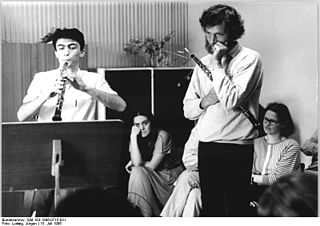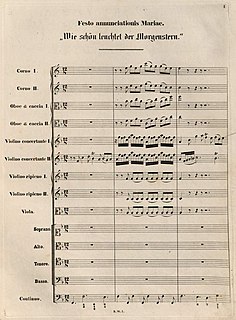The topic of this article may not meet Wikipedia's notability guideline for music .(April 2021) (Learn how and when to remove this template message) |
Albrecht Winter (born 14 June 1970) is a German violinist, Kapellmeister and academic teacher.
The topic of this article may not meet Wikipedia's notability guideline for music .(April 2021) (Learn how and when to remove this template message) |
Albrecht Winter (born 14 June 1970) is a German violinist, Kapellmeister and academic teacher.
Born in Rüdersdorf bei Berlin, Winter comes from a family of cantors, in which the Protestant church music tradition and music-making at home shaped him from an early age. After attending a special music school, he studied violin with Klaus Hertel at the University of Music and Theatre Leipzig from 1988 to 1993. During his studies, he won a prize at the International Johann Sebastian Bach Competition in 1992. From 1996 to 1997, he taught for one and a half years as an assistant at the Leipzig Hochschule. [1]
From 1997, Winter was concertmaster of the 2nd violins in the Leipzig Gewandhaus Orchestra for six years. Since 2003 he has held a professorship for violin and didactics at the Wuppertal department of the Musikhochschule Köln.
Already during their studies in Leipzig, some music (not singing!) and theology students with a penchant for early music got together and formed the vocal ensemble "Collegium Canticorum", of which Winter is still the 2nd bass today. [2] Rehearsal weekends and summer concerts with a now expanded repertoire bring them together from all parts of Germany.
In 1989, some students at Leipzig University discovered their love of salon music. Together with one of their teachers, they founded the Salonorchester Cappuccino, whose violin soloist and director is Albrecht Winter and which can now look back on a thirty-year tradition. The repertoire of the musicians, who now belong to various orchestras, presented in theme concerts ranges from arrangements of classical music to swinging film hits. The entitlement concerts of the Salonorchester Cappuccino have been an integral part of the concert programme of the Gewandhaus. [3] A hallmark of Winter's concerts is its informative, witty and entertaining conferences.
From 2004 to 2013, Winter was artistic director of the Leipziger Neues Bachisches Collegium Musicum. [4] There, in addition to Bach's secular music, he focused on that of his predecessors and reconstructed the historic Gewandhaus concerts of the 18th century.

Johann Georg Pisendel was a German Baroque musician, violinist and composer who, for many years, led the Court Orchestra in Dresden, then the finest instrumental ensemble in Europe.
The Harvard–Radcliffe Collegium Musicum is a mixed chorus at Harvard University, composed of roughly 50 voices from undergraduate and graduate student populations. Founded in 1971 to coincide with the coeducational merger of Harvard and Radcliffe College, Collegium drew from members of the Harvard Glee Club and the Radcliffe Choral Society to form a smaller mixed group that could represent Harvard on tours. Although Collegium used to perform primarily early Renaissance music, its repertoire now draws from centuries of a cappella and orchestral selections. Together with the (tenor-bass) Harvard Glee Club and the (soprano-alto) Radcliffe Choral Society, it is a member of the Harvard Choruses.
Collegium Musicum 90 is an English baroque orchestra playing on period instruments. It was founded by violinist Simon Standage and conductor Richard Hickox in 1990 and was jointly directed by them until the death of Hickox in November 2008.
The keyboard concertos, BWV 1052–1065, are concertos for harpsichord, strings and continuo by Johann Sebastian Bach. There are seven complete concertos for a single harpsichord, three concertos for two harpsichords, two concertos for three harpsichords, and one concerto for four harpsichords. Two other concertos include solo harpsichord parts: the concerto BWV 1044, which has solo parts for harpsichord, violin and flute, and Brandenburg Concerto No. 5 in D major, with the same scoring. In addition, there is a nine-bar concerto fragment for harpsichord which adds an oboe to the strings and continuo.

Angenehmes Wiederau, freue dich in deinen Auen, BWV 30.1, is a 1737 secular cantata by Johann Sebastian Bach, on a libretto by Christian Friedrich Henrici (Picander). Bach reused some of its music in later works, including Freue dich, erlöste Schar, BWV 30.2, one of his church cantatas, which was nearly entirely modelled after the secular composition.
The Monteverdi-Chor Hamburg is a mixed choir in Hamburg, the chamber choir of the University of Hamburg since 1961. Founded in 1955 by Jürgen Jürgens and directed by him until 1994, it is one of Germany's most famous concert choirs. The choir is well known for its interpretations of Baroque and Renaissance music, but covers choral music from the Renaissance to contemporary music. Since 1994, the conductor has been Gothart Stier.
Lobe den Herrn, meine Seele, BWV 143, is an early cantata by Johann Sebastian Bach. He appears to have composed the cantata for New Year's Day, probably when he was in his 20s, but whether it was first performed in Mühlhausen or Weimar is not known: the date of composition is unclear. Bach's authorship has been doubted because the cantata has several ununusual features; one of these is the scoring, it is the only Bach cantata to combine three corni da caccia with timpani.

The Café Zimmermann, or Zimmermannsches Kaffeehaus was the coffeehouse of Gottfried Zimmermann in Leipzig which formed the backdrop to the first performances of many of Bach's secular cantatas, e.g. the Coffee Cantata, and instrumental works.
Neues Bachisches Collegium Musicum is a chamber orchestra, founded in Leipzig, Saxony, Germany. It follows the tradition of collegia musica, developed by Johann Sebastian Bach, also in Leipzig. The orchestra is dedicated to historically informed performances, based on the latest research.
The Harpsichord Concerto in D minor, BWV 1052, is a concerto for harpsichord and Baroque string orchestra by Johann Sebastian Bach. In three movements, marked Allegro, Adagio and Allegro, it is the first of Bach's harpsichord concertos, composed between 1738 and 1739.

Leipziger Universitätsmusik refers to music education and performance at the University of Leipzig. Music at the university dates back to its founding of the university in the 15th century. At present, Leipziger Universitätsmusik is the name of several musical ensembles formed by students and professors, and supported by professional musicians, the choir Leipziger Universitätschor, an orchestra, two smaller instrumental ensembles, and a big band.

Burkhard Glaetzner is a German oboe virtuoso und conductor. He is one of the leading oboe players in Germany.
Dietmar Hallmann is a German musician who was professor for viola and chamber music at the University of Music and Theatre Leipzig.
August Louis Hermann Heinrich Schachtebeck was a German violinist, conductor and university lecturer.

Siegfried Pank is a German cellist and viol player. He was a member of the Gewandhausorchester in Leipzig from 1962 to 1980, and toured with the Neues Bachisches Collegium Musicum. He turned to playing the viol in historically informed performance, and lectured cello and viol at the Musikhochschule Leipzig from 1984, as professor from 1988 to 2001. He was a co-founder of the International Telemann Association in 1991, serving as its president from 2012.
The Akademische Orchester Leipzig is an amateur symphony orchestra based in Leipzig. It was founded in 1954 by the conductor Horst Förster as the Collegium musicum of the University of Leipzig and was part of the University until 1991. Alongside other cultural institutions, it was subordinate to the university's "Main Department of Culture". At the time of reunification, the university separated from its orchestra, and since then it has no longer been an official part of the university. Instead, the Academic Orchestra reorganised itself in 1991 as a nonprofit organization. The artistic director is Horst Förster.

This is a list of recordings of Bach's Wie schön leuchtet der Morgenstern, BWV 1, a chorale cantata for the Annunciation, celebrated on 25 March. Bach composed the cantata in Leipzig in 1725, as part of his second cantata cycle.
Cornelia Osterwald is a German harpsichordist and docent for early music.
Collegium Musicum Lviv is an artistic community and music agency in Lviv, Ukraine that specializes in classical music. The activities of the music agency are aimed at promoting music and poetry, involving the public in co-creation, and bridging the gap between the performer and the listener.

The Salonorchester Cappuccino is an ensemble founded in Leipzig in 1989 and dedicated to the cultivation of salon music as a form of upmarket light music.